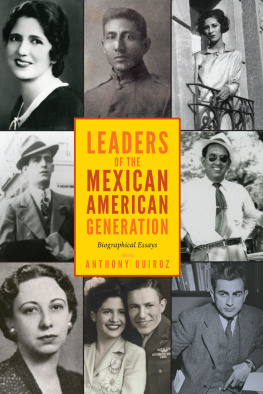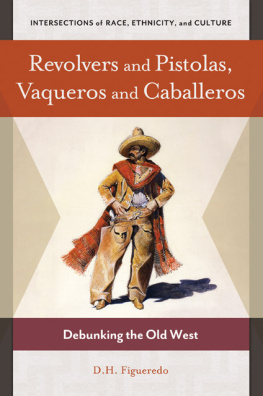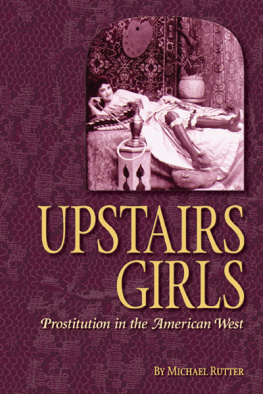Pablo Mitchell is associate professor of history at Oberlin College. He is the author of Coyote Nation: Sexuality, Race, and Conquest in Modernizing New Mexico, 18801920 (UCP, 2005). That book won the Ray Allen Billington Prize from the OAH (best book in frontier history).
The University of Chicago Press, Chicago 60637
The University of Chicago Press, Ltd., London
2012 by The University of Chicago
All rights reserved. Published 2012.
Printed in the United States of America
21 20 19 18 17 16 15 14 13 12 1 2 3 4 5
ISBN-13: 978-0-226-53268-4 (cloth)
ISBN-13: 978-0-226-53269-1 (paper)
ISBN-10: 0-226-53268-2 (cloth)
ISBN-10: 0-226-53269-0 (paper)
ISBN-13: 978-0-226-53273-8 (e-book)
Library of Congress Cataloging-in-Publication Data
Mitchell, Pablo.
West of sex : making Mexican America, 19001930 / Pablo Mitchell.
p. cm.
Includes index.
ISBN-13: 978-0-226-53268-4 (cloth : alkaline paper)
ISBN-10: 0-226-53268-2 (cloth : alkaline paper)
ISBN-13: 978-0-226-53269-1 (paperback : alkaline paper)
ISBN-10: 0-226-53269-0 (paperback : alkaline paper) 1. Mexicans Sexual behaviorSouthwest, NewHistory20th century. 2. Trials (Sex crimes)Southwest, NewCases. 3. Sex crimesSouthwest, New History20th century. 4. SexSocial aspectsUnited States. 5. MexicansSouthwest, NewSocial conditionsHistory20th century. 6. Southwest, NewRace relationsHistory20th century. 7. Marginality, SocialSouthwest, NewHistory20th century. I. Title.
HV6592 .M58 2012
364.15309790904dc23
2011031181

This paper meets the requirements of ANSI/NISO Z39.481992 (Permanence of Paper).
ACKNOWLEDGMENTS
This project is indebted to a host of programs, institutions, and individuals. A postdoctoral fellowship from the Sexuality Research Fellowship Program (SRFP) of the Social Science Research Council, with funds provided by the Ford Foundation, provided much-needed financial support, as well as a wonderful cohort of engaged, intellectually stimulating sexuality scholars. Diane Di Mauro, the director of the SRFP, was an incomparable source of enthusiasm and inspiration during and after the fellowship. The Nord Professorship at Oberlin College also provided important financial support for this project.
This book would have been impossible without the knowledge, assistance, and labor of government workers from across the country. I am grateful to the staffs of the Lorenzo de Zavala State Archives and Library, Bexar County Courthouse, New Mexico Supreme Court Archives, California Historical Society, California Supreme Court Archives, Los Angeles County Courthouse, Alameda County Courthouse, Oberlin College Library, and the outstanding public library systems of Bay Village, Cleveland, Lakewood, and Westlake, Ohio.
For over a decade, Oberlin College has been unceasing in its support of my research and writing. Thanks especially to the students at Oberlin and my coworkers in the Comparative American Studies Program, the History Department, the Office of Sponsored Programs, and the Multicultural Resource Center. I am also grateful to the following friends and colleagues: Rick Baldoz, Adrian Bautista, Yeworkwha Belachew, Jan Cooper, Judi Davidson, Sean Decatur, Nancy Dye, Eric Estes, Michael Fisher, Meredith Gadsby, Charu Gupta, Brenda Hall, Heather Hogan, Daphne John, David Kamitsuka, Kathy King, Clayton Koppes, Gary Kornblith, Wendy Kozol, Carol Lasser, Shelley Lee, Joe Lubben and Griselda Rondon, Greggor Mattson, Gina Prez, Charles Peterson, Baron Pineda, Meredith Raimondo, Renee Romano, Ari Sammartino, Len Smith, and Steve Volk. Moon-ho Jung, Paul Kramer, Shelley Lee, Natalia Molina, and Renee Romano offered much-appreciated advice on material in the book. Thanks as well to Allison Chomet and Elizabeth Supp for research assistance.
As I was revising the manuscript, I had the great fortune to be involved in the On the Borders of Love and Power workshop sponsored by the William P. Clements Center for Southwest Studies at Southern Methodist University and the Center for the Southwest at the University of New Mexico. Thoughtful comments and suggestions by workshop participants came at a critical point in the writing of this book and were enormously helpful in clarifying my arguments. I am especially grateful to cofacilitators Crista DeLuzio and David Adams.
The warmth, enthusiasm, and good cheer of Douglas Mitchell at the University of Chicago Press sustained this project for many years. I am honored and fortunate to have him as my editor. Thanks also to the wonderful work of Tim McGovern and Katherine Frentzel at the Press. Two anonymous reviewers provided careful, detailed, and judicious comments on multiple versions of the manuscript. Their comments improved this book in multiple ways, and I hope that I have done justice to their professionalism and wisdom.
Like so many, I am indebted to the generosity and good will of Ramn Gutirrez. He has been an unswerving source of advice, rigorous critique, and encouragement. Maria Montoya, Virginia Scharff, and Carroll SmithRosenberg also deserve special mention. They too are gifted mentors. They cleared precious space for me and my work in their lives, space that I know is dear and not easy to part with, and for that, and much more, I am grateful. Pawan Dhingra has cheered this project from nearly its beginning. The underbrush of liberal arts colleges can be a little dense at times, and Pawan helped me find a clearing or two where I could try to become both a teacher and a scholar.
Another set of teachers has been no less critical to the completion of this project. The staff at the Oberlin Early Childhood Center and the Westshore Montessori School played an important role in raising our children and allowing me the time and peace of mind to write this book. I am especially grateful to Kathy Tracey, Sharon Blotzer, and Missy Sinka for their commitment, creativity, and love. Thanks also to the numerous Oberlin College students and former students who cared for our children and whose love, energy, and commitment to radical politics animated our lives and our home.
My parents, Beatriz and Philip Mitchell, were my first and best teachers. Im still learning how to be a grownup (honestly, who freakin isnt?) and Im grateful that theyre still willing to help me light the way. Ben Mitchell is my brother and I aspire to be what he has become: a father, a teacher, and a gentle man. Other family members have also helped bring life to this project: Sharon Braman, the Butkevich family, the Cadavid family, the late Ruth Kipp, the McLaughlin family (Alex, Ginger, and Noah), the Mitchell/ Gallegos family (Ben, Julianne, and Estella), Jennifer Orr, the Orr/Lozier family (Lisa, Luke, and Jack), and James and Susan McLaughlin.
Ruby McLaughlin Mitchell and Tayo Mitchell McLaughlin were born in Fall 2004. Ive been working on this project for most of their lives. During that time, Ive tried really hard not to prioritize this book over them, but I know there were times when I was distracted or pissy or impatient (or distracted, pissy, and impatient) because of the book, and I apologize to them for that. Since they have lived with this book as much as just about anyone, I want them have a chance to say something in writing. Tayo would like to say that school is fun and I really like sports. Ruby says, I like science and soccer.





 This paper meets the requirements of ANSI/NISO Z39.481992 (Permanence of Paper).
This paper meets the requirements of ANSI/NISO Z39.481992 (Permanence of Paper).